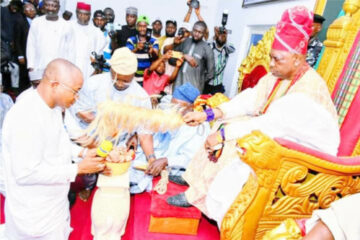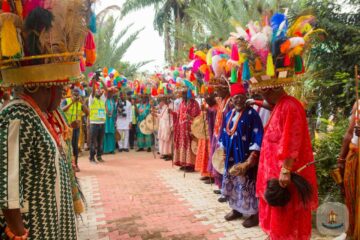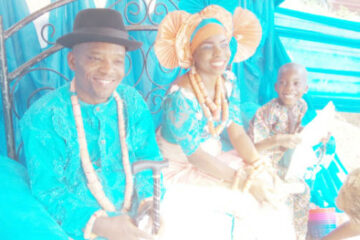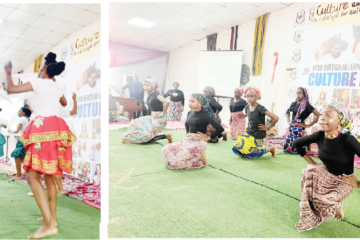Marriage in Igboland is not just an affair between the future husband and wife but also involves the parents, the extended family, and villages. First, the groom asks his potential partner to marry him. Assuming that this is affirmative, the groom will visit the bride’s residence accompanied by his father.
The Igba nkwụ (wine carrying) day is the public ceremony to signify that the girl is getting married according to Igbo traditions. In some families, this ceremony is far more important than even western church or registry marriages.
In recent times, due to legal reasons, many couples will have the traditional marriage followed by the church or registry marriage.
The responsibility for the preparation for the traditional marriage lies most heavily on the bride’s family. The family will invite the wider extended family, friends, Umunna’s, and the entire village and well-wishers to come and witness their daughter’s marriage.
They will organise for plenty of Igbo delicacies to be eaten on the day by all in attendance. There will be plenty to drink, music, dancing, and other entertainment.
The bride’s family will also organise to have her friends and any unmarried young women in the family to be part of the bridal train. These women will be dressed in matching outfits to lead out the bride in a procession.
The groom and his family will arrive at the bride’s compound and will be greeted with lots of music, dancing, and fanfare. They will be introduced to the Umunna from the bride’s family and ushered to their reserved seating area.
Kola nut and drinks will be presented, broken by the eldest man of the Umunna from the bride’s family. Traditionally, this is done for the appeasement of the gods. Nowadays, with the introduction of Christianity, prayers will also be said.
The elder of the Umunna from the groom’s family will again reiterate their intentions and their reason for coming. At this stage, the father of the bride will welcome his in-law’s to be and explain that it’s up to his daughter if the marriage should go ahead. The father will send the bride to come and see the guests.
The young woman will be led out in a fanfare of music and dance by the bridal train. The bridal train consists of the bride’s friends and any young unmarried member of the brides’ family.
She will dance to her father and kneel before him. The father will reiterate to the bride the intentions of the visitors. She will be given palm wine to drink in a calabash cup and asked to find the man she intends to marry and give the drink to him.
The groom takes the drink and dances towards the visitor’s area looking for her groom. It is traditional for the groom to hide amongst the visitors for the bride to find him.
The bride dances through the crowd and onlookers looking for the groom. When she finds him, she goes to him and, kneeling, offers him the remaining drink. The man accepts it and drinks from it and puts any amount of money in the cup for his bride.
Both, cheered on by the crowd dance together towards the bride’s father. On getting to the bride’s father, both kneel before him for his blessings. The father of the bride blesses the newlywed and offers both words of wisdom and advice.
Prayers are also said for the welfare of the couple. After the blessing, the couple arises and dance to music. Other well-wishers wishing to offer words of wisdom may also do so at this stage.
At this stage, the guests can then be fed and entertained with food, music etc.
It is common nowadays for the new couple to sit in a designated area for them whilst well-wishers come one at a time to offer them words of advice and monetary gifts.
If the bride’s family wishes to do the Idu ụnọ ceremony, that could now be done after everyone has eaten and been entertained.
The end of the day is very emotional for the bride and her family. The bride will need to pack her suitcases and belongings ready to go with her groom’s family. Usually, the umuada’s of the family will try to prevent her from leaving until the groom appeases them with money.
The bride’s family all come out to wave her goodbye and to wish them well.






